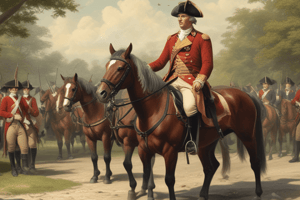Podcast
Questions and Answers
Why did the British raise taxes on the colonial Americans in the early 1760s?
Why did the British raise taxes on the colonial Americans in the early 1760s?
The British raised taxes because they had to pay off their war debt.
What made the colonists most angry about these new taxes?
What made the colonists most angry about these new taxes?
The colonists were most angry because they did not have any say about the new taxes.
What did the Sugar Act of 1764 do?
What did the Sugar Act of 1764 do?
The Sugar Act lowered the tax on imports from the Caribbean and made it easier to smuggle.
What did the Stamp Act of 1765 do?
What did the Stamp Act of 1765 do?
What were the two professions greatly impacted by the Stamp Act?
What were the two professions greatly impacted by the Stamp Act?
How did the colonists respond to the Stamp Act?
How did the colonists respond to the Stamp Act?
What is the name of the group that coordinated action to protest against the Stamp Act?
What is the name of the group that coordinated action to protest against the Stamp Act?
When Parliament repealed the Stamp Act, what did they replace it with?
When Parliament repealed the Stamp Act, what did they replace it with?
How did women help to support the boycott of British goods?
How did women help to support the boycott of British goods?
Who did the boycott negatively affect?
Who did the boycott negatively affect?
Why did colonists protest the Tea Act during the Boston Tea Party?
Why did colonists protest the Tea Act during the Boston Tea Party?
How did the British respond to the Boston Tea Party?
How did the British respond to the Boston Tea Party?
How did colonists respond to the Intolerable Acts?
How did colonists respond to the Intolerable Acts?
What did the Americans need to do to actually gain independence?
What did the Americans need to do to actually gain independence?
Where did the fighting begin during the War for Independence?
Where did the fighting begin during the War for Independence?
Why were some colonists against independence?
Why were some colonists against independence?
What is the name of Thomas Paine's pamphlet calling for independence?
What is the name of Thomas Paine's pamphlet calling for independence?
What problem was Britain facing related to Indian uprisings?
What problem was Britain facing related to Indian uprisings?
What was Britain's solution to the problem of settlers moving west?
What was Britain's solution to the problem of settlers moving west?
What was colonists' response to the Proclamation of 1763?
What was colonists' response to the Proclamation of 1763?
What solution did Britain create to manage costs of stationed soldiers?
What solution did Britain create to manage costs of stationed soldiers?
What was the colonists' response to the Quartering Acts?
What was the colonists' response to the Quartering Acts?
Flashcards are hidden until you start studying
Study Notes
Taxation and Colonial Response
- British raised taxes in the early 1760s to pay off war debt, impacting colonial Americans.
- Colonists were angered by new taxes due to a lack of representation in Parliament.
Key Legislation and Acts
- The Sugar Act of 1764 lowered import taxes from the Caribbean, facilitating smuggling.
- The Stamp Act of 1765 required all printed materials to have a government-issued stamp, directly affecting newspaper companies and lawyers.
Colonial Reactions
- Colonists responded to the Stamp Act by boycotting British goods and forming the Stamp Act Congress.
- The Sons of Liberty coordinated protests, which included violent actions against British taxation.
Declaratory Act
- After repealing the Stamp Act, Parliament issued the Declaratory Act, asserting its right to tax the colonies unconditionally.
Women's Contribution
- Women participated in boycotts by making homespun clothing and formed the Daughters of Liberty to support the cause.
Economic Impact of Boycotts
- Boycotts negatively affected merchants reliant on British goods, threatening their livelihoods.
Boston Tea Party
- Colonists protested the Tea Act during the Boston Tea Party, viewing it as an assertion of Britain's right to tax any goods.
British Response to Protests
- The British response to the Boston Tea Party was the Intolerable Acts, designed to punish the colonies.
Continental Congress
- In reaction to the Intolerable Acts, colonists convened the First Continental Congress with representatives from 12 of 13 colonies.
Independence Call
- Americans sought British recognition of their independence, which was firmly denied.
Initial Conflicts
- The War for Independence began at Lexington and Concord, Massachusetts.
Opposition to Independence
- Some colonists opposed independence, fearing that giving everyone a say would empower those they deemed unfit.
Thomas Paine's Influence
- Thomas Paine’s pamphlet "Common Sense" argued convincingly for independence from Britain.
Proclamation of 1763
- The Proclamation of 1763 was established to prevent colonists from settling west of the Appalachian Mountains after Indian uprisings.
Colonist Reaction to Proclamation
- Colonists reacted with anger, believing they had earned the right to settle in the Ohio River Valley, leading to widespread disregard for the Proclamation.
Quartering Acts
- The Quartering Acts of 1765 required colonial governments to house British soldiers, aiming to cut costs while maintaining order.
Colonial Tensions Over Troops
- Colonists were enraged by the Quartering Acts, with the New York Assembly notably refusing to comply with provisions.
Studying That Suits You
Use AI to generate personalized quizzes and flashcards to suit your learning preferences.




